|
|
|
Sort Order |
|
|
|
Items / Page
|
|
|
|
|
|
|
| Srl | Item |
| 1 |
ID:
092210
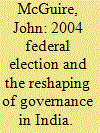

|
|
|
|
|
| Publication |
2009.
|
| Summary/Abstract |
Any assessment of political developments in post-colonial India inevitably begins with the Indian National Congress (INC). Not only is it the oldest political party in India, but it also assumed a seminal role in mobilising and leading the independence movement from the late nineteenth century through to 1947. Since then, it has dominated parliamentary politics until 1996, when it lost government to a coalition of parties, in part as a result of what was identified as deep-seated corruption in the ranks of its parliamentarians. Yet there were other factors that contributed to this decline, the most notable of which was the emergence and rise of the Bharatiya Janata Party (BJP). Indeed, it could be argued that, by the beginning of the twenty-first century, the BJP could be seen as the most significant development in defining the changing nature of Indian politics.
|
|
|
|
|
|
|
|
|
|
|
|
|
|
|
|
| 2 |
ID:
092211
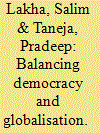

|
|
|
|
|
| Publication |
2009.
|
| Summary/Abstract |
Contemporary globalisation is viewed both as offering immense opportunities and posing a fundamental threat to the nation-state and democratic governance. To the proponents of globalisation, integration into the world economy through liberalisation of foreign trade and capital flows, combined with deregulation of the national economy, promises greater economic efficiency, higher consumption levels and generally improved living standards. For them, state intervention in the economy aimed at restricting the free play of market forces is dysfunctional, resulting in lower social and economic benefits for the population at large. Within this optimistic perspective, globalisation is thought likely to 'flatten' economic differences between nations1 and lead to a 'borderless world',2 where the barriers to flows of capital, technology, and information will be minimised if not totally removed.
|
|
|
|
|
|
|
|
|
|
|
|
|
|
|
|
| 3 |
ID:
092218
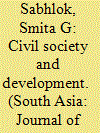

|
|
|
|
|
| Publication |
2009.
|
| Summary/Abstract |
Existing in a social space between the state and the market, civil society can be a site for both fragmentation and solidarity. While most civil society organisations (CSOs) claim to work towards a normative vision of social, economic or cultural development, they do not operate in an organisational vacuum divorced from socio-political reality. They can be representative of different interests and different identities of the people, but they can also play contradictory roles in the development process. The existence of a wide range of civil society organisations can indicate a vibrant democracy; however, if the competing visions of civil society organisations in different domains come into conflict with each other, situations of instability may arise.
|
|
|
|
|
|
|
|
|
|
|
|
|
|
|
|
| 4 |
ID:
092214
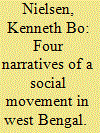

|
|
|
|
|
| Publication |
2009.
|
| Summary/Abstract |
Singur in West Bengal's Hooghly district became a household name across India when in May 2006 the state's Left Front government (LFG) announced that it would be the future location for the Tata small-car project. Here Tata Motors planned to produce the Tata Nano, the world's cheapest car, priced at only one lakh rupees. First, though, approximately 1,000 acres of agricultural land had to be acquired in Singur under the Land Acquisition Act of 1894.
|
|
|
|
|
|
|
|
|
|
|
|
|
|
|
|
| 5 |
ID:
092217
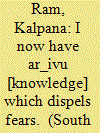

|
|
|
|
|
| Publication |
2009.
|
| Summary/Abstract |
During the 1980s and 1990s, I developed a familiarity with a very specific sub-culture in Tamil Nadu-the Catholic fishing communities of Kanyakumari, who live in a string of sandy villages stretching from the Cape itself, up to the border with Kerala. I was at this point particularly interested in popular religion and its construction of the female body. Following on from that interest, and set off against the backdrop of a familiarity with the social life of these villages, I began a series of wide-ranging sets of interviews with women I already knew on the ways they framed their experiences of puberty and maternity. The interviews threw up, as I had suspected, an intersecting range of discursive frames. And the book I will eventually bring out on this topic will be as much about the relationship between different kinds of intellectuals and rural people as it will be about female experiences per se. The interviews were deliberately conducted with those active in non-government organisations (NGOs) run by Catholic organisations in the district, as well as with school teachers, priests, midwives and healers of different kinds, with doctors, as well as with ordinary women from different age sets.
|
|
|
|
|
|
|
|
|
|
|
|
|
|
|
|
| 6 |
ID:
092205
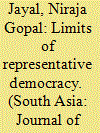

|
|
|
|
|
| Publication |
2009.
|
| Summary/Abstract |
We are conversant today with a variety of democratic deficits. There is the gap between the promise and performance of democracy; then there is also the gap between the success of procedural democracy and the failure of the project of substantive democracy. This paper reflects a different sort of democratic disappointment however. It is an interrogation, not of India's democracy per se, but of a particular strand of democratic discourse and practice in India that has become disconcertingly powerful in the last two decades. This is a line of argument that privileges representation-indeed a particular form of it-as the defining principle of democracy and in so doing, denudes the democratic ideal of all substantive content beyond representation. The microcosmic representation of all sections of the population in all institutions-not only those of public governance, but also others such as the media and the private sector-becomes the pursuit that inspires democracy, and as such every advance in this direction is seen to constitute a further deepening of democracy.
|
|
|
|
|
|
|
|
|
|
|
|
|
|
|
|
| 7 |
ID:
092219


|
|
|
|
|
| Publication |
2009.
|
| Summary/Abstract |
In a recent essay in The Age newspaper,1 John Roskam accused Judith Brett of denying the existence of the threat of terrorism in Australia, and of erecting an entire edifice of 'left-leaning' thought which, according to him, construed the powers that use such threats to national security of cynically manipulating the electorate during an election year. 'Terrorism' he argued, 'is real. Just ask those who have lost loved ones'.2 This intellectual stand-off is symptomatic of the deep rifts that are evident in discussions and debates on terrorism as a quintessentially twenty-first century threat to society. In regions such as the Indian subcontinent, acts of terror and the existence of organisations willing to resort to violence have been a fact of life for quite a while. But here too the currency of terrorism has recently assumed new value and a novel configuration.
|
|
|
|
|
|
|
|
|
|
|
|
|
|
|
|
| 8 |
ID:
092207
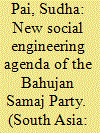

|
|
|
|
|
| Publication |
2009.
|
| Summary/Abstract |
The 'Dalit question',1 that is, the removal of discrimination, socio-economic improvement and share in political power for the lower castes, has always been at the centre of Indian politics. But recently we have witnessed the rise of Dalit parties/movements such as the Republican Party of India, the Dalit Panthers and smaller formations in different parts of the country. This Dalit assertion, first witnessed in the North Indian plains in the 1980s, has been one of the major challenges to Indian democracy in recent years. It has a qualitatively new character and distinct features which have significant implications for both democracy and development.
|
|
|
|
|
|
|
|
|
|
|
|
|
|
|
|
| 9 |
ID:
092215
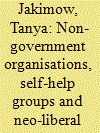

|
|
|
|
|
| Publication |
2009.
|
| Summary/Abstract |
In India the presence of a large number of non-government organisations (NGOs) is often seen to attest to the strength of its civil society. It is claimed that NGOs' close links with marginalised people can aid in the representation of the poor, thereby strengthening democratic processes in accordance with pluralist conceptions of civil society.1 Sangeeta Kamat's analysis of NGOs in India challenges this perspective. Using a Gramscian approach to civil society, she shows how NGOs can be agents in the securing of a consensus of the marginalised over unequal social and economic structures.2 It is therefore important to analyse the discrepancy between NGOs' normative and actual roles in civil society processes to understand democracy and development in India more generally.
|
|
|
|
|
|
|
|
|
|
|
|
|
|
|
|
| 10 |
ID:
092208
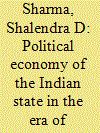

|
|
|
|
|
| Publication |
2009.
|
| Summary/Abstract |
The origins and nature of the post-Independence Indian state have been the subject of much research and debate among scholars and political activists. The state has been contradictorily and colourfully characterised as 'strong-weak', 'soft', 'overdeveloped', 'captured', a 'weak developmental state', and more recently as 'a divided Leviathan'-among other metaphors. It seems that India's democratic state has the ability to confound by displaying remarkable adaptability and resilience. Nowhere perhaps is this reflected more vividly than in India's dramatic abandonment, in 1991, of its decades-long commitment to a statist and inward-oriented economy model for an unprecedented and ambitious strategy of global economic integration.
|
|
|
|
|
|
|
|
|
|
|
|
|
|
|
|
| 11 |
ID:
092213


|
|
|
|
|
| Publication |
2009.
|
| Summary/Abstract |
In the past, leading national trade unions in India failed to develop a strong base among unorganised (informal) sector workers and limited their engagement with civil society. Recent initiatives to redress the latter are assessed with reference to the opportunities and constraints that emerge from the organisational structure and ideological and political affiliations of trade unions.
|
|
|
|
|
|
|
|
|
|
|
|
|
|
|
|
| 12 |
ID:
092209


|
|
|
|
|
| Publication |
2009.
|
| Summary/Abstract |
The rise of India as the next Asian economic giant has become synonymous with that of the information technology (IT) sector. IT has become one of India's largest exports and revenue earners, and the expansion of the IT sector has helped to shape the growth of a new middle class free from the inhibitions that shackled the old one, and which is highly visible.1 While the consumption behaviour of this new class has created demand for a wide range of products and services, there has been growing debate that the marginalised poor have not benefited because of the paucity of resources allocated to basic public infrastructure and amenities.2 Although the government has launched a series of programmes aimed at reducing poverty, it continues to exist.3 And the poor are not happy. The Bharatiya Janata Party (BJP) headlined its campaign for the June 2004 general election 'India Shining'. It lost to the Congress Party. Some of the BJP's major regional state allies such as the Telegu Desam Party (TDP) in the state of Andhra Pradesh also lost state elections held at the same time.
|
|
|
|
|
|
|
|
|
|
|
|
|
|
|
|
| 13 |
ID:
092220


|
|
|
|
|
| Publication |
2009.
|
| Summary/Abstract |
How is it that the accumulating corpus of knowledge, deriving from two centuries of imperial involvement, has not proved a firmer foundation for modern political studies?1
Why-despite a rich body of work built up over more than a century by a number of eminent theorists-do the goings-on of Indian politics elude theorisation? Is the conceptual grid that provides intelligibility to the categories conventionally used to understand and theorise Indian politics-civil society, nation-state, democracy and citizenship-meaningful in the context of India's historical experience? If not, can it really be said that India's political experience constitutes an alternative model? This paper will argue that the root of the problem can be located in the failure of the systems of representation inherited from the colonialists and the Orientalists to relate meaningfully to the Indian context.
|
|
|
|
|
|
|
|
|
|
|
|
|
|
|
|
|
|
|
|
|